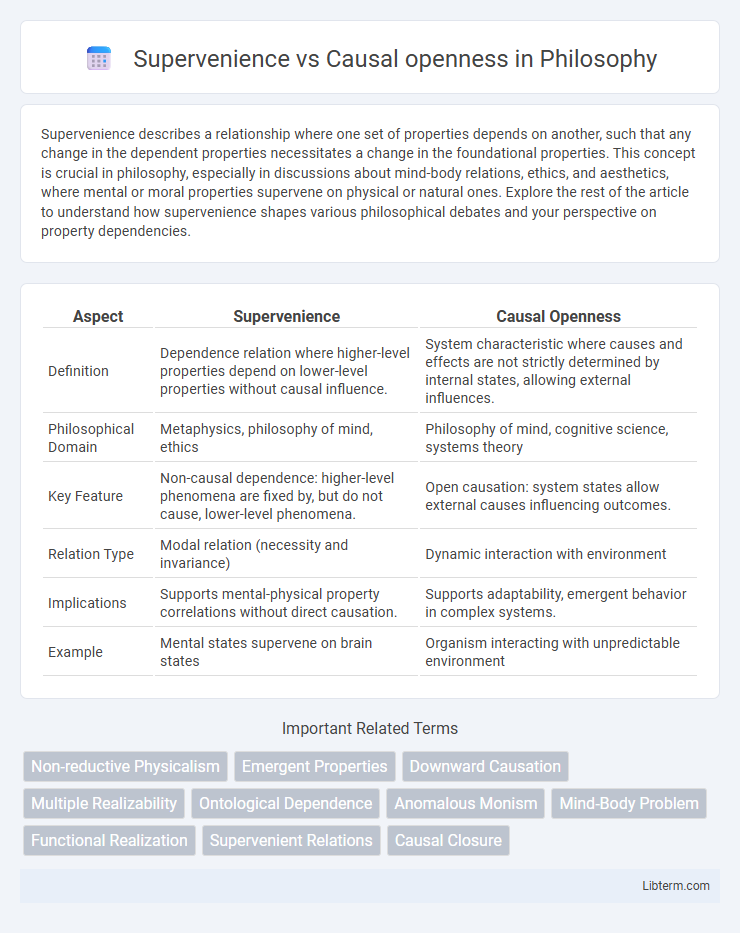Supervenience describes a relationship where one set of properties depends on another, such that any change in the dependent properties necessitates a change in the foundational properties. This concept is crucial in philosophy, especially in discussions about mind-body relations, ethics, and aesthetics, where mental or moral properties supervene on physical or natural ones. Explore the rest of the article to understand how supervenience shapes various philosophical debates and your perspective on property dependencies.
Table of Comparison
| Aspect | Supervenience | Causal Openness |
|---|---|---|
| Definition | Dependence relation where higher-level properties depend on lower-level properties without causal influence. | System characteristic where causes and effects are not strictly determined by internal states, allowing external influences. |
| Philosophical Domain | Metaphysics, philosophy of mind, ethics | Philosophy of mind, cognitive science, systems theory |
| Key Feature | Non-causal dependence: higher-level phenomena are fixed by, but do not cause, lower-level phenomena. | Open causation: system states allow external causes influencing outcomes. |
| Relation Type | Modal relation (necessity and invariance) | Dynamic interaction with environment |
| Implications | Supports mental-physical property correlations without direct causation. | Supports adaptability, emergent behavior in complex systems. |
| Example | Mental states supervene on brain states | Organism interacting with unpredictable environment |
Introduction to Supervenience and Causal Openness
Supervenience refers to a dependency relation where higher-level properties depend systematically on lower-level physical states without being reducible to them, often discussed in philosophy of mind and metaphysics. Causal openness describes systems where outputs are not fully determined by inputs, allowing for non-deterministic or unpredictable interactions often studied in complex systems and cognitive science. Understanding the distinction clarifies debates on mind-body relations and the limits of physical determinism in explaining emergent phenomena.
Defining Supervenience in Philosophy
Supervenience in philosophy describes a dependency relation where higher-level properties are determined by lower-level properties without any causal influence crossing levels. It asserts that any change in the supervenient properties necessitates a change in the subvenient base, maintaining a consistent correlation without implying direct causal interaction. This concept contrasts with causal openness, emphasizing that mental states or macro-properties are dependent on physical states but not causally reducible to them.
Understanding Causal Openness
Causal openness refers to the property of systems in which causal relationships are not fixed or fully determined, allowing for multiple potential influences and interactions within their environment. This contrasts with causal closure, where all causes can be traced entirely within the system itself. Understanding causal openness highlights the complexities in systems like the brain or social dynamics, where external factors continuously shape emergent behaviors beyond deterministic physical processes.
Historical Context and Key Debates
Supervenience emerged in the mid-20th century as a pivotal concept in philosophy of mind, defining relationships where higher-level properties depend on lower-level physical states without direct causal interaction. Causal openness, conversely, challenges deterministic frameworks by emphasizing systems where micro-level causation does not fully determine macro-level outcomes, relevant in complex systems theory and emergent phenomena. Key debates center on whether mental states supervene strictly on physical states or whether causal openness allows for non-reductive influences, impacting discussions in metaphysics, philosophy of science, and cognitive science.
Supervenience: Dependency without Direct Causation
Supervenience describes a relationship where higher-level properties depend on lower-level properties without direct causal interaction, emphasizing dependency rather than cause and effect. This concept highlights how changes in mental states correspond to changes in physical states without implying a causal direction. It contrasts with causal openness, where systems allow multiple influences and indeterminate causal pathways, underscoring the non-causal nature of supervenience in philosophy of mind and metaphysics.
Causal Openness: Flexibility and Indeterminacy
Causal openness emphasizes the flexibility and indeterminacy within systems, allowing for multiple potential outcomes based on varying initial conditions and external influences. Unlike supervenience, which suggests a fixed dependency between higher-level properties and lower-level states, causal openness permits dynamic interactions that do not strictly determine system behavior. This framework is crucial in understanding complex adaptive systems, where emergent phenomena arise from non-linear, context-dependent causal processes.
Contrasting Ontological Implications
Supervenience implies a dependency relation where higher-level properties are determined entirely by lower-level physical states, suggesting a closed ontological system with no independent causal powers beyond the base level. Causal openness, in contrast, posits that higher-level phenomena can exert genuine causal influence not reducible to physical predicates, indicating an ontologically pluralistic framework. This contrast highlights fundamental debates on whether reality is strictly monistic with fixed causal chains or allows for emergent properties with autonomous causal roles.
Applications in Mind-Body Philosophy
Supervenience in mind-body philosophy describes how mental states depend systematically on physical brain states, ensuring no mental change occurs without a physical change. Causal openness challenges strict reductionism by suggesting mental phenomena may exert influence beyond physical causation, allowing for non-physical causative factors. These concepts shape debates on consciousness, with supervenience supporting physicalist views and causal openness opening space for dualist or emergentist interpretations of mental causation.
Challenges and Criticisms in Contemporary Analysis
Supervenience faces challenges related to its inability to fully account for downward causation, raising doubts about its explanatory power in mental-physical interactions. Critics argue that causal openness, emphasizing indeterminacy and context-sensitivity in complex systems, complicates strict supervenient relationships by allowing non-deterministic influences. Contemporary analysis highlights difficulties in reconciling causal closure of the physical with the open, dynamic nature of biological and cognitive processes, prompting debates on the adequacy of supervenience in describing emergent phenomena.
Conclusion: Navigating the Supervenience-Causal Openness Divide
Navigating the supervenience-causal openness divide reveals that supervenience asserts dependent relationships where higher-level phenomena are determined by underlying physical states, while causal openness emphasizes systems exhibiting indeterminacy and emergent behaviors beyond deterministic physical causation. This distinction is crucial for philosophy of mind and complex systems theory, as it challenges reductionist approaches and supports multi-level explanations. Recognizing when to apply supervenience or causal openness frameworks enables nuanced understanding of phenomena ranging from consciousness to dynamic ecosystems.
Supervenience Infographic

 libterm.com
libterm.com